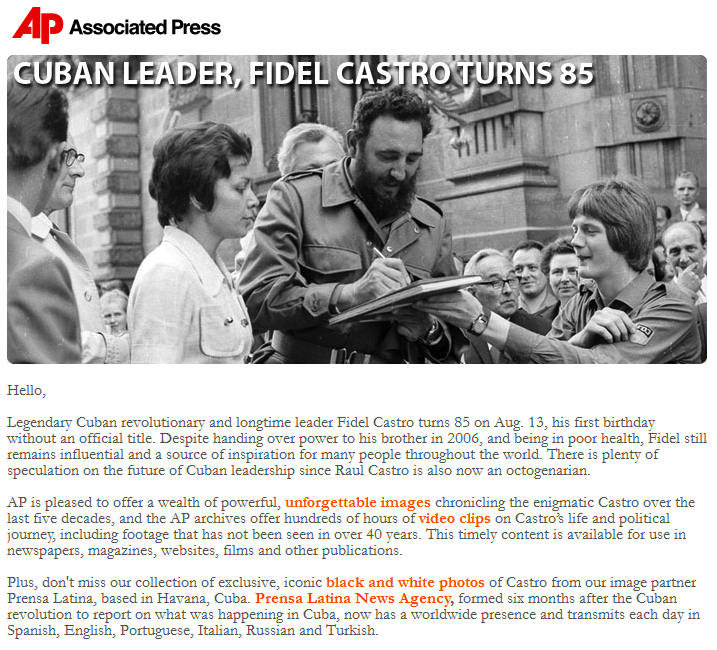Co-authored by Pedro Pizano
Fidel Castro just celebrated his 85th Birthday. One would think that after 52 years of running a police state in Cuba, the media would accept that Castro is a brutal oppressor and tyrant. Comparable, no doubt, to any of the totalitarian despots still alive today. For example, Bashar al-Assad in Syria (41 years of dynastic tyranny) or Teodoro Mbasogo Obiang in Equatorial Guinea (31 years of bloody oppression). Yet, surprisingly, when it comes to North Korea and Cuba, one of the most trusted wire services in the world, the Associated Press (AP), cares more about business than about journalistic ethics and the truth.
Evidence of the vicious nature of these regimes, and the lack of civil liberties and political rights that their citizens are granted, are more than well documented. Barbara Demick, in her latest book, Nothing to Envy, paints a harrowing picture of the "ordinary lives of ordinary North Koreans." By tracing the lives of six defectors, Demick chronicles the effect of government propaganda and the harsh realities of survival. Human rights abuses in North Korea spread far beyond violations of freedom of expression: government-orchestrated poverty and starvation are responsible for the deaths of millions. Yet, the ruling Kim dynasty is so successful in covering up their crimes that, during the 1990s famine, many North Koreans believed government propaganda that the United States was responsible for food shortages. One woman Demick interviewed even blamed herself for the deaths of her family members. "It never occurred to her to blame the regime," Demick writes.
We had the chance to listen to Demick's stories first hand at this year's Oslo Freedom Forum. You can watch her speech here:
Compare this to what the AP has said about North Korea in its efforts to cater to the regime, and, consequently, its announcement that it will be the first western wire service to have a bureau there. Then read what Michael Calderone of the Huffington Post and Isaac Stone Fish of the New York Times have to say. Isn't it striking that the AP would partner with the Korea Central News Agency (KCNA) without even once mentioning that it's a state-run propaganda tool? Are the AP stringers in North Korea suffering from the same brainwashing as North Korean citizens?
Now consider this recent press release from the AP commemorating Fidel Castro's birthday:

Castro is proclaimed by the AP as an "iconic" leader and a "source of inspiration for many people throughout the world." Ché Guevara is lauded as a "revolutionary hero" in the picture captions. Castro is no more "iconic" than Hitler, Mussolini, Mao, or Pinochet in historical context. However, it is highly unlikely that the AP would try to sell pictures and collections of Hitler as an "enigmatic" historical figure who is "still a source of inspiration." Castro and Ché may, indeed, be a source of inspiration for ignoramuses, washed-up ideologues, tendentious institutions, or people who still believe that he accomplished some "good things," (much as Hitler "created jobs" or Mussolini "made the trains run on time" or Pinochet "saved Chile from communism") but it is shocking that the AP would sink this low to make a buck.
Again, the AP has partnered with an official state news agency of Cuba, Prensa Latina, without offering any caveats. As Tom Blumer quipped recently on BizzyBlog, "the guess here is that the AP would have more of a problem cooperating with anything or anybody associated with Fox News than it does in cooperating with the island nation's equivalent of the old Soviet Union's Tass."
Please consider, dear reader, that in Cuba, ordinary citizens cannot invite their friends over, or hold any kind of meeting, for fear of being accused of subversion. Cubans cannot even host something as innocuous as a book club. Few of them even own books -- leading to the creation of underground "independent" libraries whose operators risk prosecution and prison for such subversive acts as owning a copy of a banned novel or history book.
There is no freedom of speech; Internet access is severely restricted; there is no freedom of press in Cuba; property rights do not exist (your stuff isn't yours -- it can be confiscated at the whim of the regime); Cubans have one currency while party leaders and tourists have another; you aren't allowed to switch jobs without government permission (and the government is the dominant employer); and most jarring, you are forbidden to leave Cuba without the government's written permission. Even the ignorant executive or venal cog in the AP machine writing should draw the line between the free and unfree world where you cannot vote with your feet and leave. Those who try to leave Cuba often end up drowning or eaten by sharks after days on a raft in the ocean.
Is any of this undeniable reality of life under Castro mentioned in a single caption of the thousands of photographs offered by the AP? Not once. Castro, they repeat, is a "revolutionary hero."
Fidel Castro and Che Guevara are offered by the AP as sources of inspiration. Hitler, Mussolini, and Mao, all cold-blooded killers, are also inspirations. But for whom? A new generation of psychopaths and dictators? For shame.
Thor Halvorssen is president of the New York-based Human Rights Foundation and founder and CEO of the Oslo Freedom Forum. Follow him on Twitter and on Facebook.
Pedro Pizano is the global media liaison for the Oslo Freedom Forum and the Public Advocacy Coordinator for Human Rights Foundation . Follow him on Twitter and on Facebook.